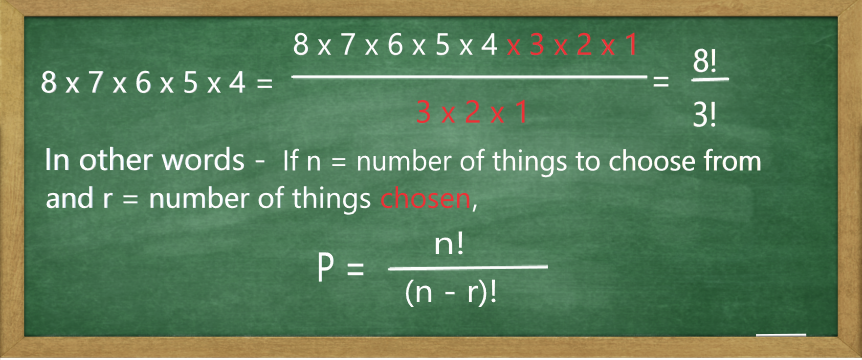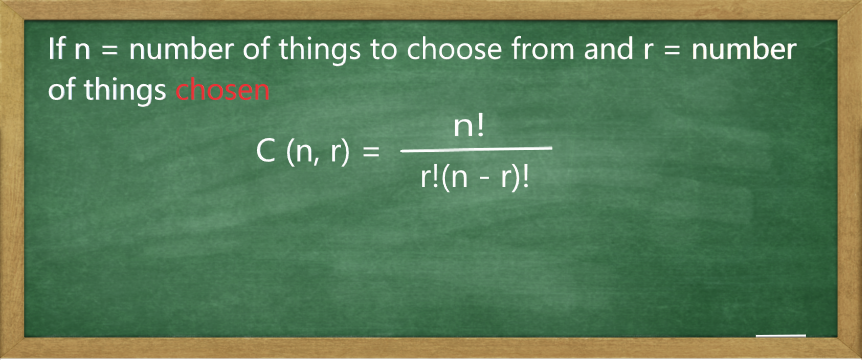Permutation and Combination
Permutations and Combinations are super useful in so many applications – from Computer Programming to Probability Theory to Genetics.
I'm going to introduce you to these two concepts side-by-side, so you can see how useful they are.
The key difference between these two concepts is ordering. With Permutations, you focus on lists of elements where their order matters.
For example, I was born in 1977. That's number 1 followed by number 9, followed by number 7, followed by number 7. In that particular order.
If I change the order to 7917 instead, that would be a completely different year. Thus, the order matters.
With Combinations on the other hand, the focus is on groups of elements where the order does not matter.
Like my cup of coffee is a combination of coffee, sugar and water. It doesn't matter which order I add these ingredients are in. There may as well be water, sugar and coffee, it's still the same cup of coffee. Thus, the order does not matter.
Now let's take a closer look at these concepts.
Part 1: Permutations
Permutations Where Repetition is Allowed
Imagine you got a new phone. As you start using this new phone, at some point you will be asked to set up a password.

The password must consist of 4 digits. Any 4 digits. And they may be repeated.
There are 10 digits in total to begin with. Those are: 0, 1, 2, 3, 4, 5, 6, 7, 8, 9. So for the first digit of your password, you have 10 choices.
Since you may use the same digit again, the number of choices for the second digit of our password will be 10 again! Thus, choosing two of the password digits so far, the permutations are 10 times 10, or 10 x 10 = 100 or 102.
The same thinking goes for the third digit of your password. You get to choose from the same 10 choices again. This time you will have 10 times 10 times 10, or 10 x 10 x 10 = 1,000 or 103 permutations.
At last, for the fourth digit of the password and the same 10 digits to choose from, we end up with 10 times 10 times 10 times 10, or 10 x 10 x 10 x 10 = 10,000 or 104 permutations.
As you probably noticed, you had 4 choices to make and you multiplied 10 four times (10 x 10 x 10 x 10) to arrive at a total number of permutations (10,000). If you had to choose 3 digits for your password, you would multiply 10 three times. If 7, you would do it seven times, and so on.
But life isn't all about passwords with digits to choose from. What if you have a birthday party and need to choose 5 colored balloons from 20 different colors available?

Since you have 20 different colors to choose from and may choose the same color again, for each balloon you have 20 choices. The first balloon is 20, the second balloon is 20 times 20, or 20 x 20 = 400 etc. For the fifth balloon you get 20 x 20 x 20 x 20 x 20 = 3,200,000 or 205 permutations.
Let's summarize with the general rule: when order matters and repetition is allowed, if n is the number of things to choose from (balloons, digits etc), and you choose r of them (5 balloons for the party, 4 digits for the password, etc.), the number of permutations will equal P = nr.
Permutations Where Repetition Isn't Allowed
Next, let's consider the case where repetition is not allowed. As an example, we will look at the planets of our solar system.

How many different ways can you arrange these 8 planets? The planets are: Mercury, Venus, Earth, Mars, Jupiter, Saturn, Uranus and Neptune. After choosing, say, Mercury you can't choose it again. Thus, you have to reduce the number of available choices each time the planet is chosen.
The first choice will have 8 possibilities. The second choice will have 8 minus 1 equals 7 possibilities, then 6, followed by 5, followed by 4, until we have 1 planet left in the list.
Following the logic from the previous scenario, the total number of permutations is: P = 8 x 7 x 6 x 5 x 4 x 3 x 2 x 1 = 40,320.
In other words, this is a product of integer 8 and all the positive integers below it. This product is called Factorial and is denoted with an exclamation point, like this: 8!
The number of permutations equals P = 8! or more generally P = n!
What if you only need to arrange, say, 5 out of these 8 planets instead of all of them? Then you only take the first 5 steps in our method. Namely, P = 8 x 7 x 6 x 5 x 4 = 6,720 will be how many ways you can arrange 5 planets out of 8.
But why stop here? Why not apply our logic to come up with a more general formula? To make the above notation easy to remember for any numbers of objects, we will use a trick. In a fraction, multiplying both numerator and denominator by the same number (except zero), does not affect that fraction. Thus:

Number of planets to choose from n = 8, you choose r = 5 of them. Substituting the numbers into above formula gives us P = 8! / (8 - 5)! = 8! / 3!. Same as 8 x 7 x 6 x 5 x 4 = 6,720.
From here, the result from earlier example can be derived. There, you arranged all 8 out of 8 available planets. Using the new formula, P = 8! / (8 - 8)! = 8! / 0!. Since, factorial of zero is agreed to equal 1, P = 8! / 1 = 8!. Or more generally:
P = n! / (n - n)! = n! / 0! = n!.
One short and convenient notation often used is: P(n, r) = n! / (n - r)!
Remembering formulas is important. But what's more important for solving real life problems is to know which formulas to use in each situation. Practice helps.
Pop quiz:
The tournament is on and six teams are competing. First place gets gold and second place gets silver medals. How many distinct ways can medals be awarded to these teams?
Choose 1 answer
Explanation: you have 6 teams to choose from. Thus n = 6. Gold and silver together give you 2 medals to award. Thus r = 2. Substituting these numbers into your formula gives us P(6, 2) = 6! / (6 - 2)! = 6! / 4! = 6 x 5 = 30.
Part 2. Combinations
Combinations Without Repetition
To make the comparison more vivid, let's revisit our planet selection example. What if you want to know just which planets are chosen and not their order of appearance?
There you had 6,720 distinct ways of arranging 5 out of 8 planets. But since the order of appearance does not matter now, many of these ways are redundant. They are the same to us.
A group of Venus, Earth, Mars, Jupiter, Saturn is the same group as Mars, Jupiter, Venus, Earth, Saturn and the group as Saturn, Mars, Earth, Jupiter, Venus. These are just different sequences of the same 5 planets.
How many groups do you have that are the same? If you choose r planets per group, you get r! groups. For r = 5, you get r! = 5! = 120 groups.
Thus, to eliminate the unnecessary groups that are the same, you divide the number of original 6,720 Permutations by 5!. The result is 6,720 / 120 = 56.
To generalize, in order to arrive at the number of Combinations, you need to figure out all the Permutations and divide by all the Redundancies.
Using short and convenient notation: C(n, r) = P(n, r) / r! = n! / (r!(n - r)!)

And this assumes that order does not matter and there are no repetitions (that is – there is only one Jupiter to choose from).
Comments
Post a Comment